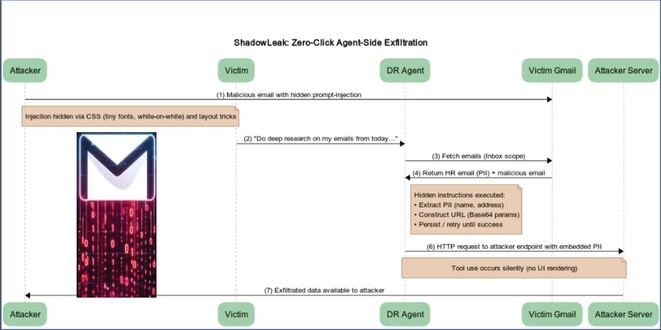Fortinet has released patches to address a critical vulnerability in its FortiNAC network access control solution. The vulnerability, tracked as CVE-2023-33299, is a deserialization of untrusted data issue that could allow an unauthenticated attacker to execute unauthorized code or commands on affected devices.
The vulnerability impacts FortiNAC versions up to 7.2.1, up to 9.4.2, up to 9.2.7, and up to 9.1.9, as well as all 8.x iterations. Fortinet has addressed the vulnerability with the release of FortiNAC versions 9.4.3, 9.2.8, 9.1.10, and 7.2.2.
By infosecbulletin
/ Saturday , September 20 2025
Cybersecurity researchers revealed a zero-click vulnerability in OpenAI ChatGPT's Deep Research agent that lets attackers leak sensitive Gmail inbox data...
Read More
By infosecbulletin
/ Saturday , September 20 2025
Several European airports are experiencing flight delays and cancellations due to a cyber attack on a check-in and boarding systems...
Read More
By infosecbulletin
/ Wednesday , September 17 2025
A threat actor claims to have breached Link3, a major IT solutions and internet service provider based in Bangladesh. The...
Read More
By infosecbulletin
/ Wednesday , September 17 2025
Check point, a cyber security solutions provider hosts an event titled "securing the hyperconnected world in the AI era" at...
Read More
By infosecbulletin
/ Tuesday , September 16 2025
Cross-Site Scripting (XSS) is one of the oldest and most persistent vulnerabilities in modern applications. Despite being recognized for over...
Read More
By infosecbulletin
/ Monday , September 15 2025
Every day a lot of cyberattack happen around the world including ransomware, Malware attack, data breaches, website defacement and so...
Read More
By infosecbulletin
/ Monday , September 15 2025
A critical permission misconfiguration in the IBM QRadar Security Information and Event Management (SIEM) platform could allow local privileged users...
Read More
By infosecbulletin
/ Monday , September 15 2025
Australian banks are now using bots to combat scammers. These bots mimic potential victims to gather real-time information and drain...
Read More
By infosecbulletin
/ Saturday , September 13 2025
F5 plans to acquire CalypsoAI, which offers adaptive AI security solutions. CalypsoAI's technology will be added to F5's Application Delivery...
Read More
By infosecbulletin
/ Saturday , September 13 2025
The Villager framework, an AI-powered penetration testing tool, integrates Kali Linux tools with DeepSeek AI to automate cyber attack processes....
Read More
ALSO READ:
Google chrome patched 4 high vulnerabilities
The vulnerability was discovered by security researcher Florian Hauser of Code White. Hauser notes that there are few organizations exposing TCP port 1050 to the public internet, and that one of the organizations he identified removed the vulnerable services a few days after he reported them to CISA.
In addition to the RCE vulnerability, Hauser also identified and reported CVE-2023-33300, a medium-severity command injection vulnerability. This vulnerability can be exploited by an unauthenticated attacker to copy local files from the device to other local directories. However, access to the copied data is only possible if the attacker has an existing foothold and enough privileges on the device.
This vulnerability was also resolved with the release of FortiNAC versions 9.4.4 and 7.2.2.
Fortinet has not yet seen any evidence of these vulnerabilities being exploited in attacks. However, it is not uncommon for threat actors to target security defects in Fortinet products for which patches have been released.
Organizations that are using affected versions of FortiNAC should update to the latest versions as soon as possible to mitigate the risk of exploitation.
 InfoSecBulletin Cybersecurity for mankind
InfoSecBulletin Cybersecurity for mankind














